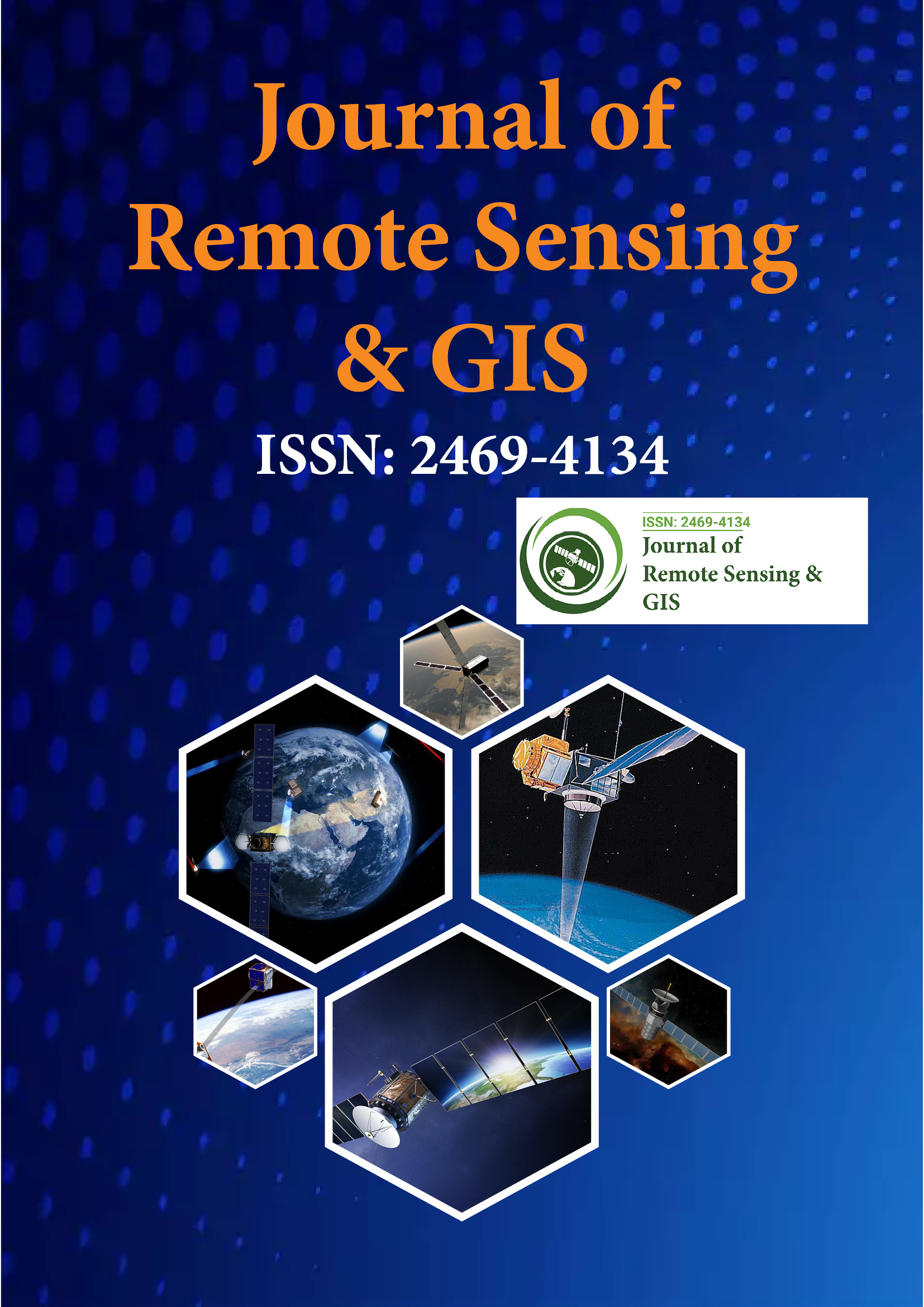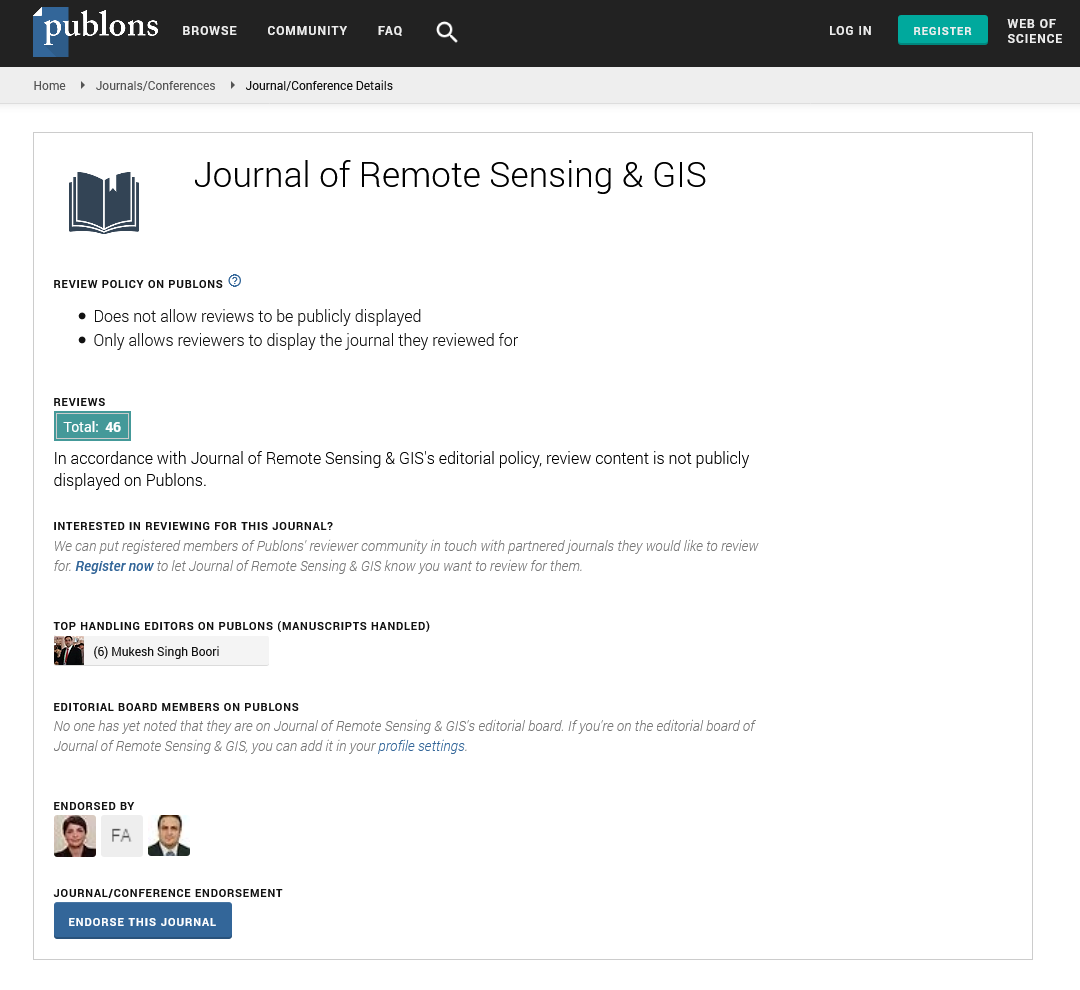Indexed In
- Open J Gate
- RefSeek
- Hamdard University
- EBSCO A-Z
- OCLC- WorldCat
- Publons
- International Scientific Indexing
- Euro Pub
- Google Scholar
Useful Links
Share This Page
Journal Flyer

Open Access Journals
- Agri and Aquaculture
- Biochemistry
- Bioinformatics & Systems Biology
- Business & Management
- Chemistry
- Clinical Sciences
- Engineering
- Food & Nutrition
- General Science
- Genetics & Molecular Biology
- Immunology & Microbiology
- Medical Sciences
- Neuroscience & Psychology
- Nursing & Health Care
- Pharmaceutical Sciences
Opinion Article - (2023) Volume 12, Issue 6
Remote Surveillance Technologies: Navigating the Ethical Landscape
Chester Polayn*Received: 02-Nov-2023, Manuscript No. JGRS-23-23303; Editor assigned: 06-Nov-2023, Pre QC No. JGRS-23-23303(PQ); Reviewed: 20-Nov-2023, QC No. JGRS-23-23303; Revised: 27-Nov-2023, Manuscript No. JGRS-23-23303(R); Published: 04-Dec-2023, DOI: 10.35248/2469-4134.23.12.320
Description
Remote science and surveillance technologies have expanded our capabilities to observe, monitor, and study the world around us. These technologies encompass a wide range of applications, from environmental monitoring and disaster response to national security and public health. While they offer tremendous benefits, they also significant ethical and privacy concerns that require careful consideration and regulation. One of the primary ethical concerns associated with remote surveillance is the potential invasion of privacy. Surveillance technologies, including security cameras, drones, and satellite imaging, have the capacity to capture people's activities and personal information without their consent. This intrusion into individuals' private lives can be problematic, particularly when it occurs without a legitimate reason or appropriate oversight. For instance, the widespread deployment of security cameras in public spaces and the increasing use of facial recognition technology raise concerns about mass surveillance. People may feel constantly monitored, leading to self-censorship and a chilling effect on freedom of expression. Moreover, the potential misuse of collected data by government agencies or corporations for surveillance purposes further exacerbates these privacy concerns. The collection of data through remote surveillance raises questions about data ownership, consent, and control. In many cases, individuals are unaware of the extent to which their data is being collected, shared, and analyzed. Ethical concerns arise when people's personal information, behaviors, and habits are collected and used for commercial purposes, surveillance, or profiling without their knowledge or consent. Additionally, the ownership of data collected through remote surveillance is often unclear.
Remote surveillance systems are vulnerable to hacking and data breaches, posing significant ethical concerns. Unauthorized access to surveillance data can lead to the exposure of sensitive personal information, privacy violations, and even security threats. For example, if surveillance cameras in public spaces are compromised, criminals could use the live footage to plan crimes or target individuals. Moreover, the use of surveillance technology for malicious purposes, such as stalking or harassment, is a important anxiety. As these technologies become more accessible, the potential for abuse grows, highlighting the need for robust security measures and ethical guidelines. Another ethical challenge is the potential for discrimination and bias in remote surveillance systems. These systems often rely on algorithms and machine learning to analyze and interpret data. If the algorithms are biased or trained on data that reflects societal biases, the surveillance outcomes can be skewed and discriminatory, disproportionately affecting certain groups. Facial recognition technology, for example, has faced criticism for exhibiting racial and gender bias in its accuracy. When such technologies are deployed in surveillance systems, it can lead to unfair profiling and targeting of specific racial or ethnic groups, exacerbating existing societal inequalities.
Informed consent is a fundamental principle in ethical data collection. In the context of remote surveillance, obtaining informed consent from individuals who may be subject to surveillance is challenging. In public spaces, where surveillance is prevalent, obtaining consent from every individual captured by cameras or sensors is virtually impossible. Moreover, even in cases where individuals are aware of surveillance, they may not fully understand the extent of data collection, analysis, and potential consequences. This raises questions about whether individuals can truly provide informed consent in such situations. Ethical concerns can also arise from "mission creep" and "function creep." Mission creep refers to the expansion of the original purpose of surveillance beyond its initial intent. For example, a surveillance system deployed for traffic monitoring might be repurposed for tracking individuals' movements or activities.
Function creep refers to the use of surveillance data for purposes other than what was originally intended. Data collected for one purpose might be used for unrelated purposes without the knowledge or consent of individuals. Both mission and function creep raise ethical issues related to privacy, consent, and the potential for abuse. It is essential to establish clear boundaries and safeguards to prevent these types of expansion and misuse. Certain populations, such as marginalized communities, immigrants, and refugees, are more vulnerable to the ethical and privacy challenges posed by remote surveillance. These communities may be disproportionately targeted or affected by surveillance practices, leading to increased discrimination and social inequalities. Achieving this balance requires careful consideration of the necessity, proportionality, and transparency of surveillance practices. It also involves ongoing public dialogue and collaboration between stakeholders, including government agencies, technology companies, civil rights organizations, and the general public. Governments, international organizations, and regulatory bodies must work together to establish ethical guidelines and laws that govern the use of surveillance technologies. These regulations should ensure that surveillance practices are conducted in a manner that respects human rights and the principles of fairness and justice.
Remote science and surveillance technologies offer numerous benefits in various domains, including public safety and disaster management. However, they also present significant ethical and privacy challenges that require careful consideration and regulation. Balancing the advantages of these technologies with respect for individual privacy and civil liberties is essential to ensure that remote surveillance practices align with ethical principles and societal values. Public awareness, transparency, and accountability are key components of addressing these challenges and fostering responsible and ethical remote science and surveillance practices.
Citation: Polayn C (2023) Remote Surveillance Technologies: Navigating the Ethical Landscape. J Remote Sens GIS. 12:320.
Copyright: © 2023 Polayn C. This is an open-access article distributed under the terms of the Creative Commons Attribution License, which permits unrestricted use, distribution, and reproduction in any medium, provided the original author and source are credited.

